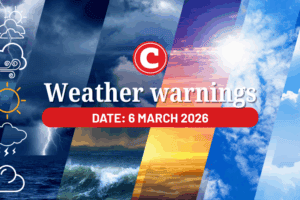This summer is going to be different.

The department of water and sanitation (DWS) has urged members of the public to continue with stringent water saving efforts until dam levels are acceptable, Letaba Herald reports.
The department released the weekly dam levels report amid predictions of rains in parts of the country, and the report indicated that the average dam levels have dropped from 65.9% last week to 65%.
The DWS report comes after the South African Weather Service (SAWS) announced that good spring rains are expected, and are likely to recur over days.
SAWS announced they expect a change in the rain pattern soon. There is a good summer circulation pattern developing and this summer is completely different to the previous summer where we had the El Nino circulation influencing our rainfall over the central parts of the country. It is going to be different.
SAWS further said they are expecting 15-25 millimetres of rain along with thunderstorms in the Free State.
Currently, the Bloemfontein System, with four dams serving mainly Mangaung, decreased by 0.6% from 38.1% to 37.5%. The dam was at 33.8% during the same time last year.
In Gauteng, the Vaal Dam is at 85.6% compared with last week when it was 86.5% . The Vaal River System, consisting of 14 dams and serving mainly Gauteng, Sasol and Eskom, experienced a slight decrease by 0.9% from 76.4% to 75.5%. The system was at 51.8% in the same period last year.
READ MORE: Severe tropical storm heading to SA, warns weather service
In the Western Cape, dam levels have decreased slightly from last week to 35.9%. The Theewaterskloof Dam is at 27.9% (2016: 52.8%); Calitzdorp is at 28%(2016: 87.7%) and Leeugamka is at 6.2% (2016: 23.5%). The average dam levels for the province at this time last year was 62.1% compared with last week’s average of 36%.
City of Cape Town authorities are trying to find ways to curb water use.
In the Eastern Cape the Algoa System with five dams serving Nelson Mandela Bay is at 31.4% from 31.5%. Last year the system was recorded at 72%. Kouga is stable at 14.5%, the same as last week. Impofu is down at 53.9% from 54.7%; last year at the same time it was at 83.1%. Haarlem experienced a slight increase at 23.5%. Last week it was at 19.9% while Groendal is at 51.5% from 49.4%.
The Amathole System, with six dams serving Buffalo City, increased from 59.2% to 60.7%. Last year this time it was at 80.3%.
In North West, Setumo is at 92.4%, a slight decrease from 92.8% last week .
The Crocodile West system, which has six dams serving mainly Tshwane, Madibeng and Rustenburg, decreased slightly to 89.7% this week. Last week it was at 90.8%. The system was recorded at 88% last year.
The Umgeni Dam system in KwaZulu-Natal, which has five dams serving eThekwini and Msunduzi, Pietermaritzburg, decreased from 54.5% to 53.7%. The system was at 45.2% in the same period last year. Albert Falls is at 23.9%, down from 24.7%. Inanda decreased from 58.9% to 58.2% and Hazelmere decreased from 99.4% to 98.3%.
The Northern Cape province is at 87.8% this week, an increase of 2.2% from 85.6% last week. Karee in the Northern Cape is at 2.6%, down from 3.4% last week.
By far Limpopo dams levels are the highest, with Magoebaskloof bursting at 100.1%, Nandoni at 97.8% and De Hoop at 97.1%.
In Mpumalanga, dam levels are slightly lower at an average of 71.2% from 72.7% last week.
The provincial dams are performing satisfactorily with the Blyderivierpoort at 88.7%, Loskop at 92.9% and Ohrigstad at 64.3%.
– Caxton News Service
Support Local Journalism
Add The Citizen as a Preferred Source on Google and follow us on Google News to see more of our trusted reporting in Google News and Top Stories.






